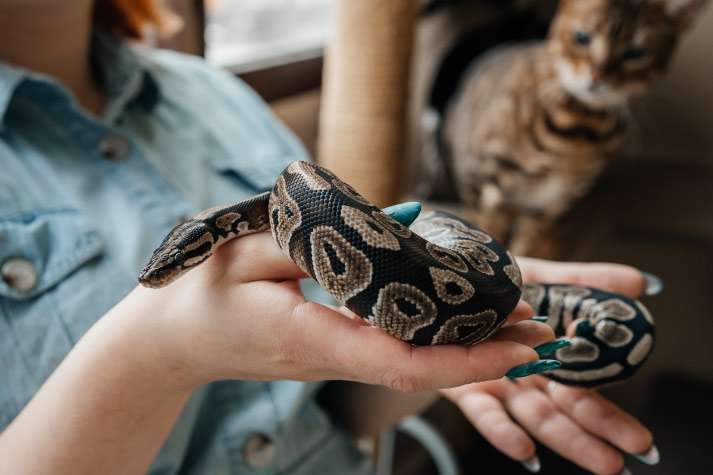
27 Nov
Exotic Pet Trade Must Be Sanctioned Heavily
A recent spike in the confiscation of exotic wildlife species being trafficked from Thailand and Malaysia to airports in South India has drawn attention to the still-flourishing pet trade and trafficking industry in the country.
According to official data, Chennai serves as a hub for illicit international exotic wildlife trading, with its airport making up 33% of all such seizures made at international airports. While the city’s customs prevented 18 such attempts in 2023-24, information and data suggest that exotic wildlife traders have begun exploring other landing points like Bengaluru, Hyderabad, and Vishakapatnam.
Exotic pets have become something of a status symbol in the post-pandemic era, acting as something to aspire towards. Numerous people are spending multiple lakhs of rupees to buy and own exotic animals like iguanas, rare birds, exotic tortoises, venomous snakes, and alligators.
It’s not as though these transactions are much of a secret; several social media channels advertise the sale of such animals, occasionally going so far as offering tips regarding their diet and general care, making this a very open secret. Certain establishments in Chennai and Bengaluru cater to such people who prefer in-person transactions, which helps traffickers immensely. Since direct flights from Bangkok and Kuala Lumpur to these southern cities take only 3 or so hours, the trafficked and intoxicated animals can survive the journey.
Such trafficking and violate break several Indian laws, including the Wildlife Protection Act of 1972, which prohibits the import and possession of exotic animals without prior permission from the state’s wildlife authorities and the relevant agencies.
The union government’s attempts to regulate this trade in 2020 via the Parivesh portal have not been effective either. In fact, the illegal wildlife trade has far-reaching consequences, with a report in 2020 by the Financial Action Task Force highlighting how illicit animal trade is used in money laundering.
Aside from all the legal trouble that an exotic pet can get you into, introducing an exotic animal to the Indian ecosystem can also lead to the spread of zoonotic diseases (diseases that spread from animals to humans). There is also the concern of such animals escaping confinement and quicky becoming an invasive species, not to mention the fact that a lot of these animals can inflict harm that we cannot cure; quickly the average Indian hospital is unlikely to carry antivenom for an exotic snake bite, risking the health and safety of those who are tasked with reducing the instances of illicit wildlife trade.






AUTHOR’S BIO
Carry My Pet
Passionate pet enthusiasts and globetrotters, dedicated to easing furry friends' journeys worldwide. Penning tales of compassion at CarryMyPet, where every relocation is a tail-wagging adventure.